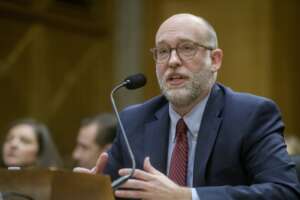If Russell Vought’s confirmation hearing to run the Office of Management and Budget was a boxing match, the judges would’ve given him the win on points. Democrats on the Senate Homeland Security and Governmental Affairs Committee didn’t land any knock out questions and Vought bobbed and weaved enough to avoid any self-inflicted knock downs.

Vought offered some insights around hot management topics like telework and remote work. He stayed away from getting Democrat jabs about Schedule F. And he ducked questions about how he would address the Impoundment Control Act, the 1974 law that restricts presidential authority to impound funds enacted by law. Vought and other incoming Trump administration supporters have said they believe the Impoundment Control Act is illegal and plan to challenge the law.
Nothing in the almost two-hour hearing seems to indicate Vought will not win enough Republican support to get through the committee vote, and likely the full Senate.
Here are five federal management-focused highlights from the hearing, including approximate time stamps in case you want to watch these specific questions and answers. Questions and answers have been edited for clarity.
Schedule F and federal workers (59:02)
Sen. Andy Kim (D-N.J.): You said in your written testimony here, “The civil servants at OMB are amongst the most resourceful and innovative I’ve worked with.” But I’ve also heard you say in other circumstances: “We want the bureaucrats to be traumatically affected when they wake up in the morning. We want them not to want to go to work because they are increasingly viewed as the villains. We want to put them in trauma.”
I raise this with you because I was a career nonpartisan civil servant. I worked in multiple departments and agencies. I guess I just wanted to ask you why you would lose a language like villains and talking about people serving our nation in those comments?
Vought: I was referring to the bureaucracies that I believe have been weaponized, and there are portions of weaponized bureaucracies across the federal government. That doesn’t mean there’s not amazing career civil servants, many of whom I’ve worked with at OMB. I look forward to, if confirmed, getting back to work with them and being able to rely on their expertise, their understanding the federal programs and to be able to help, allow them to help us have more implementable policies on behalf of the President United States. But I do believe that there are bureaucracies that are weaponized against the American people.
Kim: At the end of your term as OMB director, you implemented Schedule F, and you implemented that as well at OMB, do you remember what percentage of personnel at own be you categorized as Schedule F?
Vought: We implemented it at 90%. Again, Senator, that was not to fire anyone. It was to change their classification.
Kim: What is the purpose for the change of that classification?
Vought: It’s to ensure that the President, who has policy setting responsibility, has individuals who are also confidential policymaking positions are responding to his views, his agenda and works under the same basis that most Americans work on, which is they have to do a good job or they may not be in those positions for longer. I didn’t find that to be the case with regard to anyone at OMB.
Kim: But you felt that it was necessary to take this step still and hang that over them?
Vought: The President had a policy. He instructed all agency heads to use the Schedule F classification. You look at OMB, it is essentially all policymaking officials. That’s why we had a higher percentage. And I am someone that is going to abide by the President’s viewpoints. I think it was a sound policy as it pertains to making sure that the President has career civil servants that are going to give us all of their knowledge and expertise and disagreement at times as to what they think about a potential proposal …
Kim: I just wanted to ask this question, which is has the President-elect had conversations with you about restarting Schedule F in starting January 20?
Vought: I don’t speak to the conversations that I have with the President. Those are private deliberations, and I’m not here to announce anything on behalf of when [the incoming administration.]
Telework/remote work (1:40:42)
Sen. Joni Ernst (R-Iowa): In the years since COVID, our nation’s capital has remained a ghost town as private companies of all sizes, from coast to coast, have called their employees back to the office.
Some employees claim to be working in D.C. while living more than 2,000 miles from their office. As you are aware, the Office of Management and Budget holds the critical responsibility of ensuring the federal workforce delivers meaningful results for the American people. Strong leadership from your office to correct the Biden administration’s “asleep at the wheel” approach to federal workforce management would send a very powerful and much-needed message to the rest of the government. To this end, I will ask a few key questions. First, will you share your daily schedule with the public?
Vought: Yes.
Ernst: Congress has a set 60% utilization goal for your headquarters building and the headquarters building of each federal agency. What steps will you take to get each agency to meet Congress’s goal?
Vought: Well, I think we’re going to make it a priority. And obviously you’ve heard through your Department of Government Efficiency (DOGE) leadership, with the leadership of the President’s DOGE, that this is a major area that they’re looking at. We’re going to be looking at ways that OMB can come along beside and ask the right questions, both on the management and the budget side, to get a sense for how are agencies monitoring their own employees that might be benefiting from the DC pay rate when they’re not living in DC. So part of it is having a theory of the case, which we clearly have to do that oversight, and then to get into these roles and to figure out where we are on a day-to-day granular basis, and then figure out what can be done about it.
Ernst: What would your plan be to get federal employees, including those that are covered by collective bargaining agreements to show up for work?
Vought: Well, we’re going to take a look at the collective bargaining agreements. Obviously, we’re aware of the extent to which the Biden administration is locking in or attempting to bind the Trump administration with the CBAs that last an extended period of time. I don’t have anything to announce other than to agree with you that it’s a concerning phenomenon and one that we are looking at very closely.
Government shutdowns (34:28)
Sen. Maggie Hassan (D-N.H.): Government shutdowns put public safety and our national security at risk, but you have repeatedly, Mr. Vought, called for brinkmanship around government shutdowns and opposed bipartisan deals to keep the government open. In 2011, for example, you wrote in an article that “Republicans simply must be prepared to shut the government down.” And “need to dig deep and embrace the sort of brinkmanship that shows they are playing to win.” If confirmed, you would play a role in negotiations to prevent a government shutdown later this spring. Why have you repeatedly advocated the use of the threat of a government shutdown as a political bargaining chip? If confirmed, would you continue to favor a partisan agenda over keeping the government open?
Vought: I don’t think I have been a person that has wanted to have government shutdowns. I’ve had to be the one that kept the government open consistent with the law for the longest shutdown in history. I know the impact that it has on the federal government, and I want to be a part of a process that sends budgets as soon as they can, meeting all statutory deadlines to be able to start the process with the appropriators as early as possible on a bipartisan basis, recognizing the appropriations bills have to have bipartisan support, and to get that done as soon as possible so that you don’t have the kind of pile ups at the end of the fiscal year that we have seen. I think the breakdown of the budget process here in Congress is something that has not been good, and I hope that it is brought back to a good degree, and that we can have a bipartisan spending process of which I look forward to participating in, if confirmed.
Impoundment Control Act (17:03)
Sen. Gary Peters (D-Mich.): Under your leadership in 2019, OMB illegally withheld $214 million that Congress appropriated to the Department of Defense to provide security assistance to Ukraine. The Government Accountability Office concluded that OMB actions were a violation of the Impoundment Control Act and that your actions then forced Congress to reappropriate the funds. Just four years ago, you told this very committee that under your leadership, OMB would abide by the Impoundment Control Act. However, your past actions and public statements suggest that you may not follow this law in the future. So my question for you, sir is if you are confirmed as OMB director again, do you commit to follow the law and not allow OMB to withhold funding from programs that Congress as appropriate?
Vought: I will always commit to upholding the law. I disagree with the characterization of the [Government] [Accountability] Office. My time at OMB, we followed the law consistently, and we will continue to do so.
Peters: So that you can withhold funds that are appropriated by Congress? Do you think that’s within the law again?
Vought: Senator, we did not hold inappropriately funds. We were engaged in a policy process with regard to how funding would flow to Ukraine. We released the funding by the end of the fiscal year.
Peters: Do you believe the Impoundment Control Act of 1974 is the law of the land that you must follow?
Vought: It is the law of the land. As you know, the President has run on that issue. He believes it’s unconstitutional. For 200 years, presidents had the ability to spend less than an appropriation if they could, if they could do it for less, and we have seen the extent to which this law has contributed to waste, fraud and abuse. But as it pertains to the parameters of how we would use that that’s something that his team will have to consider when they are confirmed in these roles.
Government contracting and China (1:31:22)
Sen. Josh Hawley (R-Mo.): One of the one of the important functions of OMB is the role that it plays in managing procurements through the Office of Federal Procurement Policy. I think, would you agree with me, that it is a problem, and by the way, I think one out of every 10 taxpayer dollars goes to federal contractors. So that’s a lot of money. That’s a big part of our budget. Would you agree with me that it’s a problem when we are sending federal contracting dollars to entities, firms, especially consulting firms, that are simultaneously taking money from and doing business with our most lethal opponents, like China, for example. Doesn’t that strike you as a little strange?
Vought: That is concerning, yes.
Hawley: Here’s an example, prime example, of this kind of behavior, McKinsey, the consulting firm, got, in the last year for which we had full numbers available, over $851 million worth of consulting work. They had 90 prime contracts with the Defense Department. They got $98 million in contracts from the Army; $130.2 million from the Air Force, $37 million from the Navy, I think they advised on the F-35 fighter jet program and the Air Force Space and Missile Systems Center. At the same time, they had 1,000 employees in China. They were doing business directly with the Chinese government, and they advised Chinese state-owned enterprises that have now been blacklisted by our own military. Now my view is that if they want to do business with China, I don’t recommend it, but I suppose it’s fine, so long as it’s not illegal. But I don’t think they should simultaneously be getting hundreds of millions, approaching a billion dollars, in contracts, federal contracts, military contracts, from our own government. Here’s my question for you, you’re going to have a lot of influence in this process through the procurement rules and process, will you be an advocate for protecting American taxpayer dollars in this contracting process where hundreds of billions of dollars are spent every year? Will you be an advocate for protecting that and making sure it’s not going to entities who are effectively double-dealing and advising our enemies at the same time?
Vought: Absolutely. I’m very excited, if confirmed, getting back to being able to work with OFPP, getting a hand on the guidance that we’re giving governmentwide as part of the Federal Acquisition Regulatory Council, and to really look at what’s being what are the regulations that are in place, and how can we get them better.
The post Vought bobs, weaves way through OMB nomination hearing first appeared on Federal News Network.

